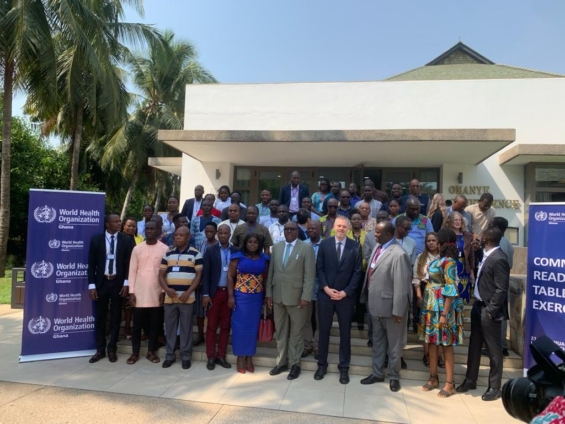The Country Representative to Ghana for the World Health Organisation (WHO), Professor Francis Chisaka Kasolo, has highlighted the crucial role communities play in handling public health emergencies.
According to him, most health emergencies originate and conclude within communities, thus, capacities and resources at the community level need to be strengthened to enable early detection and containment of health emergencies.
Professor Kasolo underscored the significance of involving communities in healthcare.
He pointed out instances where the lack of community engagement in health matters, especially during emergencies, resulted in significant loss of lives.

"Tackling health emergencies starts in communities, therefore it is important to prepare communities to be ready to combat these emergencies," he said.
Reflecting on past events, he recalled the early days of the Ebola outbreak in West Africa, noting that communities were aware of the epidemic three months before it was officially reported by the WHO. Tragically, many lives were lost due to this delay.
Drawing lessons from the Covid-19 pandemic, Professor Kasolo emphasised the pivotal role of community members in prevention, preparedness, readiness, and response to emergencies of any kind.
Professor Kasolo made these remarks during a three-day tabletop exercise on community readiness for public health emergencies. The event was organised by the WHO in collaboration with the United Kingdom (UK) Health Security Agency, the Ministry of Health, and the Ghana Health Service (GHS).
The tabletop exercise aimed to enhance the operational readiness of communities in detecting, notifying, and responding to public health threats. It provided a unique opportunity to identify strengths, gaps, and priorities for community readiness, paving the way for improvements.
Targeting three communities from two districts in the Eastern Region, Ghana stands out as the first country globally to conduct such an exercise.

Professor Kasolo mentioned that Ghana's willingness to explore innovative approaches prompted this choice. The information gathered from these communities will be used to develop a programme that incorporates communities nationwide.
In a speech read on his behalf, the Director-General of the GHS, Dr. Patrick Kuma-Aboagye, highlighted Ghana's experiences with various outbreaks, including lassa fever, yellow fever, and marburg virus disease, amid the ongoing Covid-19 pandemic.
Despite notable progress in reducing lead time for detecting and controlling public health emergencies, challenges in surveillance systems, response planning, workforce adequacies, and stockpile supplies persist.
Dr. Franklin Asiedu-Bekoe, Director of the Public Health Division of the GHS, stressed the importance of partnering with affected communities before and during emergencies.
This collaboration could leverage community strengths to protect lives and livelihoods effectively. The community readiness tabletop exercise, he stated, recognises communities as proactive contributors to the collective resilience of public health systems and national health security.
On her part, the UK Public Health Rapid Support Team, Dr. Claire Bayntun, expressed confidence that the outcomes of the exercise would be relevant not only to the participating communities but also to other communities and countries responding to public health emergencies.
Latest Stories
-
We can’t fight galamsey, it’s a waste of time – Former MP
55 seconds -
Gyamfi Kumanini SECTECH appeals for urgent government support amid infrastructure crisis
6 minutes -
Bright Simons exposes rot at Development Bank Ghana
8 minutes -
Ghana and neighbours host 160,000 displaced persons as EU pledges €10m support for West Africa
11 minutes -
Bonn Climate Talks: Africa has eyes on $1.3 trillion climate finance roadmap
13 minutes -
Career Fair inspires rural students in Tano North to dream bigger
17 minutes -
Bridging Africa’s data science and artificial intelligence gap: How ERDSI is leading the change to meet global demands
18 minutes -
Over 200 former MMDCEs meet Bawumia as NPP flagbearer race intensifies
32 minutes -
Commitment to fiscal responsibility key to economic stability – Stanbic Bank’s Oforiwaa Attipoe
32 minutes -
PMI crowned champions of the 2025 GMA Group CEO’s Cup
49 minutes -
Fidelity Bank launches ‘Wheels and Homes Expo 2025,’ bridging gap to home and car ownership
55 minutes -
OSP vs Ofori-Atta: Former Kufuor advisor shoots down political colourisation debate
1 hour -
Commissioner of Insurance charges insurers to champion informal sector products
1 hour -
U.S. visa is a privilege, not a right – Embassy in Ghana
1 hour -
Big Chef S4: Rena bids her brother, Jaden, goodbye; Serwaa clinches 2nd Star Chef title
1 hour

